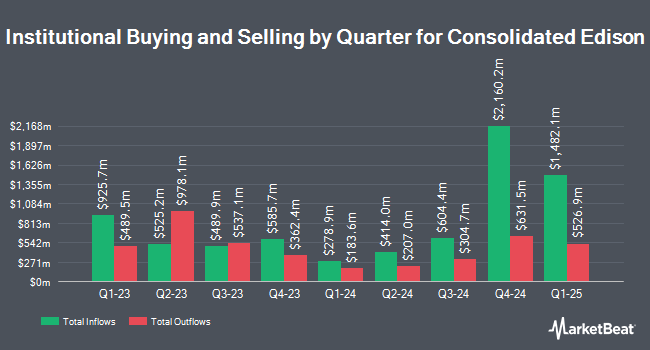Hennessy Advisors Inc. lowered its holdings in Consolidated Edison, Inc. (NYSE:ED - Free Report) by 4.7% during the first quarter, according to its most recent disclosure with the Securities & Exchange Commission. The firm owned 136,436 shares of the utilities provider's stock after selling 6,700 shares during the quarter. Hennessy Advisors Inc.'s holdings in Consolidated Edison were worth $15,088,000 as of its most recent SEC filing.
A number of other institutional investors and hedge funds also recently added to or reduced their stakes in ED. Vanguard Group Inc. lifted its stake in Consolidated Edison by 1.2% during the 4th quarter. Vanguard Group Inc. now owns 42,455,662 shares of the utilities provider's stock worth $3,788,319,000 after acquiring an additional 488,752 shares in the last quarter. Geode Capital Management LLC increased its stake in Consolidated Edison by 1.5% during the fourth quarter. Geode Capital Management LLC now owns 8,984,022 shares of the utilities provider's stock worth $799,684,000 after purchasing an additional 130,234 shares during the period. UBS AM a distinct business unit of UBS ASSET MANAGEMENT AMERICAS LLC lifted its position in shares of Consolidated Edison by 6.0% during the fourth quarter. UBS AM a distinct business unit of UBS ASSET MANAGEMENT AMERICAS LLC now owns 4,820,449 shares of the utilities provider's stock worth $430,129,000 after purchasing an additional 271,088 shares in the last quarter. Norges Bank purchased a new position in shares of Consolidated Edison in the fourth quarter valued at approximately $399,824,000. Finally, Northern Trust Corp boosted its stake in shares of Consolidated Edison by 10.2% in the fourth quarter. Northern Trust Corp now owns 4,207,753 shares of the utilities provider's stock valued at $375,458,000 after purchasing an additional 390,708 shares during the period. Hedge funds and other institutional investors own 66.29% of the company's stock.
Wall Street Analysts Forecast Growth
ED has been the topic of a number of research reports. UBS Group increased their target price on shares of Consolidated Edison from $110.00 to $113.00 and gave the stock a "neutral" rating in a report on Friday, March 21st. Scotiabank upped their price objective on Consolidated Edison from $100.00 to $101.00 and gave the stock a "sector perform" rating in a research report on Monday, February 24th. Morgan Stanley decreased their target price on Consolidated Edison from $94.00 to $93.00 and set an "underweight" rating for the company in a report on Thursday, May 22nd. KeyCorp cut Consolidated Edison from a "sector weight" rating to an "underweight" rating and set a $90.00 target price for the company. in a research note on Wednesday, May 14th. Finally, Barclays upped their price target on Consolidated Edison from $100.00 to $101.00 and gave the stock an "underweight" rating in a report on Monday, May 5th. Three analysts have rated the stock with a sell rating, seven have given a hold rating and two have assigned a buy rating to the stock. Based on data from MarketBeat.com, the stock presently has an average rating of "Hold" and an average price target of $104.27.
View Our Latest Analysis on Consolidated Edison
Consolidated Edison Stock Up 0.1%
NYSE ED traded up $0.13 during trading hours on Friday, hitting $103.89. 3,337,346 shares of the company were exchanged, compared to its average volume of 2,305,642. The company has a 50 day moving average of $106.74 and a two-hundred day moving average of $100.51. The firm has a market cap of $37.43 billion, a price-to-earnings ratio of 19.83, a PEG ratio of 3.05 and a beta of 0.27. Consolidated Edison, Inc. has a 52-week low of $87.28 and a 52-week high of $114.87. The company has a quick ratio of 0.93, a current ratio of 1.01 and a debt-to-equity ratio of 1.07.
Consolidated Edison (NYSE:ED - Get Free Report) last released its quarterly earnings data on Thursday, May 1st. The utilities provider reported $2.25 EPS for the quarter, missing analysts' consensus estimates of $2.30 by ($0.05). Consolidated Edison had a net margin of 11.93% and a return on equity of 8.62%. The business had revenue of $4.80 billion during the quarter, compared to analysts' expectations of $4.21 billion. During the same quarter in the previous year, the company posted $2.15 EPS. Equities research analysts anticipate that Consolidated Edison, Inc. will post 5.62 earnings per share for the current year.
Consolidated Edison Announces Dividend
The firm also recently disclosed a quarterly dividend, which will be paid on Monday, June 16th. Stockholders of record on Wednesday, May 14th will be issued a $0.85 dividend. The ex-dividend date of this dividend is Wednesday, May 14th. This represents a $3.40 dividend on an annualized basis and a dividend yield of 3.27%. Consolidated Edison's payout ratio is currently 62.85%.
About Consolidated Edison
(
Free Report)
Consolidated Edison, Inc, through its subsidiaries, engages in the regulated electric, gas, and steam delivery businesses in the United States. It offers electric services to approximately 3.7 million customers in New York City and Westchester County; gas to approximately 1.1 million customers in Manhattan, the Bronx, parts of Queens, and Westchester County; and steam to approximately 1,530 customers in parts of Manhattan.
Read More

Before you consider Consolidated Edison, you'll want to hear this.
MarketBeat keeps track of Wall Street's top-rated and best performing research analysts and the stocks they recommend to their clients on a daily basis. MarketBeat has identified the five stocks that top analysts are quietly whispering to their clients to buy now before the broader market catches on... and Consolidated Edison wasn't on the list.
While Consolidated Edison currently has a Reduce rating among analysts, top-rated analysts believe these five stocks are better buys.
View The Five Stocks Here
Almost everyone loves strong dividend-paying stocks, but high yields can signal danger. Discover 20 high-yield dividend stocks paying an unsustainably large percentage of their earnings. Enter your email to get this report and avoid a high-yield dividend trap.
Get This Free Report
Like this article? Share it with a colleague.
Link copied to clipboard.